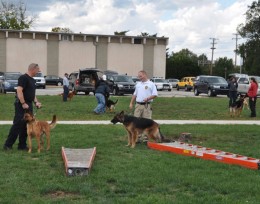
Participants at the Working Dog Critical Care Clinic received classroom instruction on evaluating their dogs’ conditions and the skills the handlers would need to treat the injuries.
Search dogs save lives in disasters. But who saves the lifesavers?
That concern was the focus of a two-day training session at Calamityville—Wright State’s National Center for Medical Readiness.
About 20 search dogs and 30 handlers from as far away as Florida attended the Sept. 22-23 Working Dog Critical Care Clinic, which instructed handlers on how to treat their injured canines when immediate medical care isn’t available.
The dogs are used to detect narcotics, explosives and human remains. Others are trained for patrol work, locating those missing in disasters and even detecting illegally confiscated wildlife.
It is vital to be able to provide emergency care in a theater of operations for working dogs, which are a crucial part of disaster response.
“This is something near and dear to my heart because I’ve been on numerous deployments where we’ve had to evaluate a K-9 that’s been catastrophically injured,” Athena Haus, president of the Ohio Disaster Search Dogs, told the Fairborn Daily Herald. “Their handlers don’t always know how to handle the situation, and on deployment we are typically not able to access vet care.”
The clinic was taught by Cindy Otto, a veterinarian at the University of Pennsylvania and director of the Penn Vet Working Dog Center. Otto, Ph.D., is a recognized canine trauma specialist. Dayton-area veterinarians also volunteered their time and expertise to help assist at the clinic.
Participants received classroom instruction on evaluating their dogs’ conditions and the skills the handlers would need to treat the injuries. Topics included how to maintain and assess vital functions, treating the effects of canine trauma, hemorrhage, fractures, sprain/strains, dehydration, heat, cold and toxicity.
There were also training opportunities on the National Center for Medical Readiness at Calamityville site that included searching in confined spaces, on a debris field with different detection options, as well as working on agility equipment.
Among those attending the clinic were teams from Florida, Michigan, Indiana and Ohio, including the Dayton, Miami Township and Wright State University police departments.
The mission of the National Center for Medical Readiness is to educate and prepare civilian and military health care professionals who respond to natural disasters, public health emergencies and the consequences of weapons of mass destruction.

 Milling around
Milling around  Wright State recognizes Nursing Professor Kim Ringo for advancing international student success
Wright State recognizes Nursing Professor Kim Ringo for advancing international student success  Wright State honors graduating students for distinguished doctoral dissertations
Wright State honors graduating students for distinguished doctoral dissertations  Top 10 Newsroom videos of 2025
Top 10 Newsroom videos of 2025  Museum-quality replica of historic Hawthorn Hill donated to Wright State
Museum-quality replica of historic Hawthorn Hill donated to Wright State 